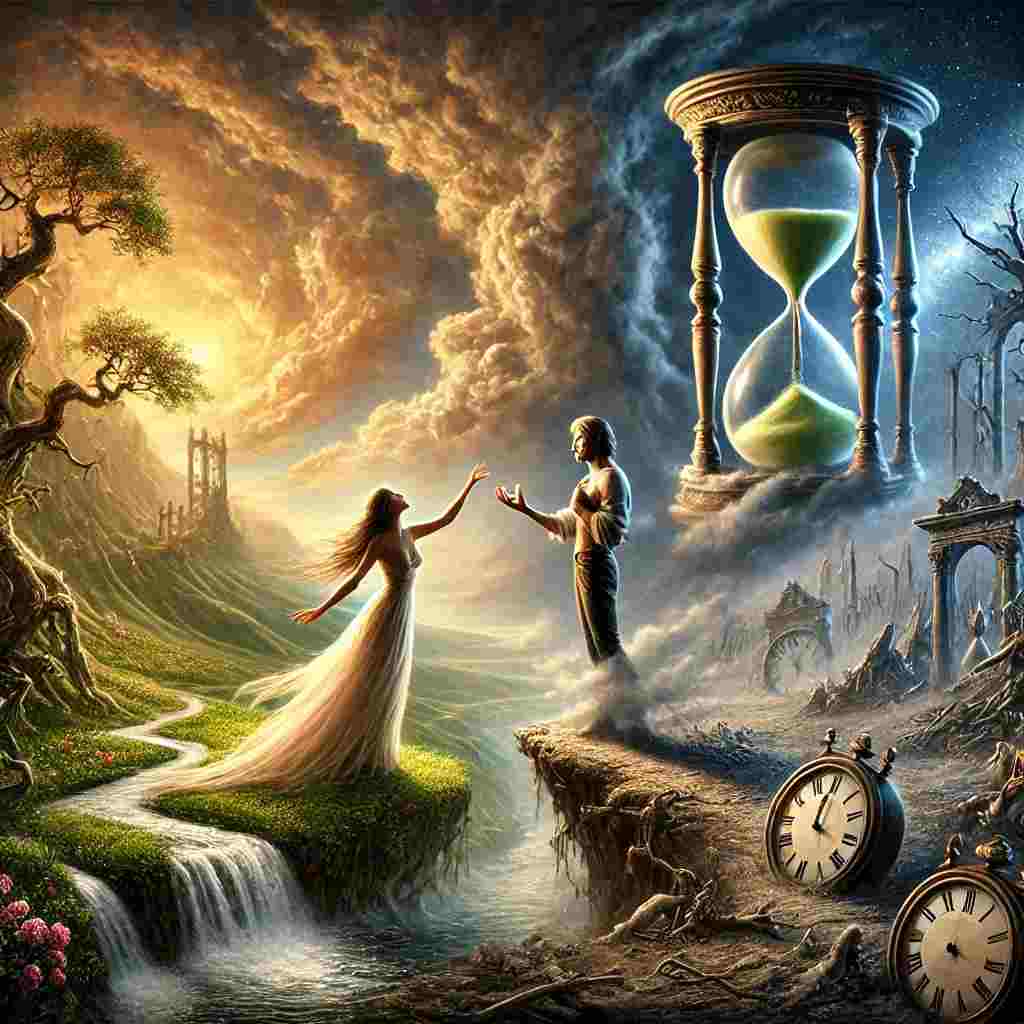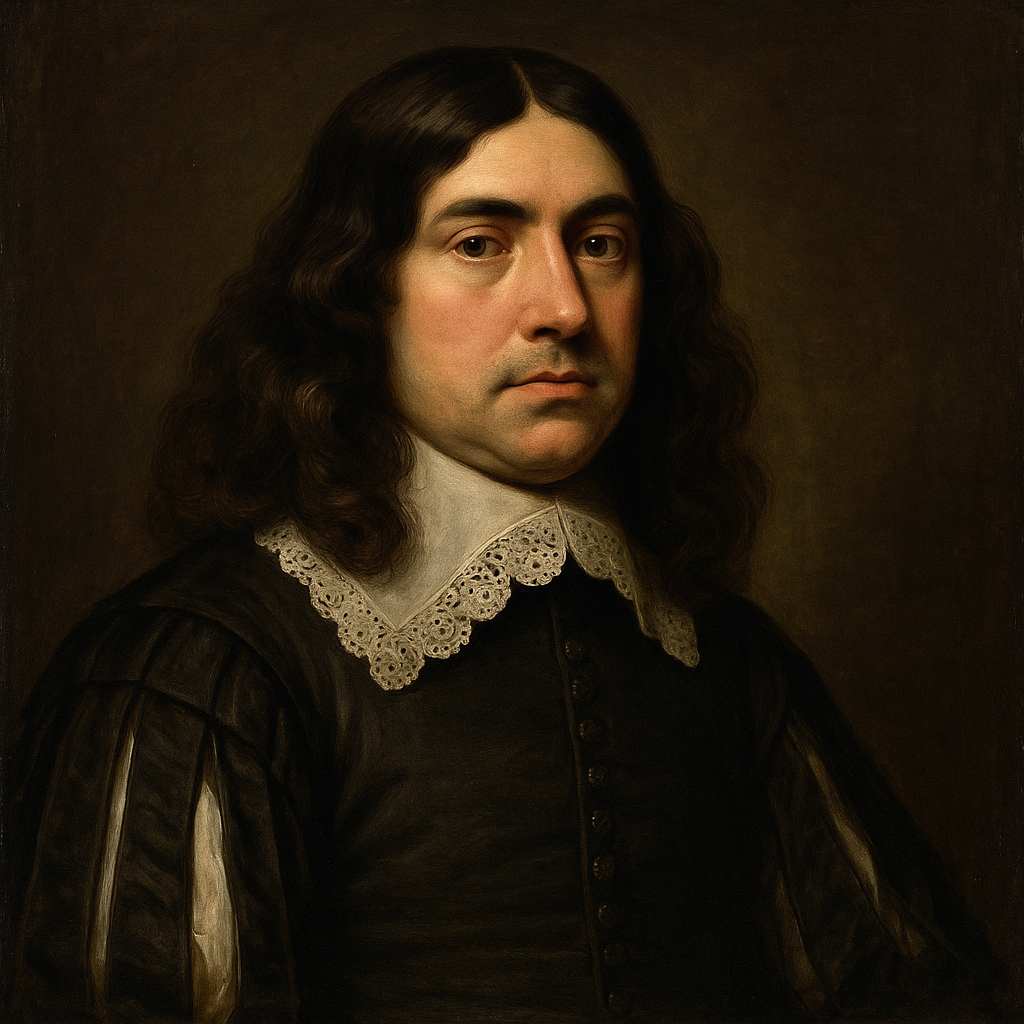To His Coy Mistress
Andrew Marvell
1621 to 1678

Had we but world enough and time,
This coyness, lady, were no crime.
We would sit down, and think which way
To walk, and pass our long love’s day.
Thou by the Indian Ganges’ side
Shouldst rubies find; I by the tide
Of Humber would complain. I would
Love you ten years before the flood,
And you should, if you please, refuse
Till the conversion of the Jews.
My vegetable love should grow
Vaster than empires and more slow;
An hundred years should go to praise
Thine eyes, and on thy forehead gaze;
Two hundred to adore each breast,
But thirty thousand to the rest;
An age at least to every part,
And the last age should show your heart.
For, lady, you deserve this state,
Nor would I love at lower rate.
But at my back I always hear
Time’s wingèd chariot hurrying near;
And yonder all before us lie
Deserts of vast eternity.
Thy beauty shall no more be found;
Nor, in thy marble vault, shall sound
My echoing song; then worms shall try
That long-preserved virginity,
And your quaint honour turn to dust,
And into ashes all my lust;
The grave’s a fine and private place,
But none, I think, do there embrace.
Now therefore, while the youthful hue
Sits on thy skin like morning dew,
And while thy willing soul transpires
At every pore with instant fires,
Now let us sport us while we may,
And now, like amorous birds of prey,
Rather at once our time devour
Than languish in his slow-chapped power.
Let us roll all our strength and all
Our sweetness up into one ball,
And tear our pleasures with rough strife
Through the iron gates of life:
Thus, though we cannot make our sun
Stand still, yet we will make him run.
Andrew Marvell's To His Coy Mistress
Andrew Marvell's "To His Coy Mistress" is a 17th-century metaphysical poem that blends sensual imagery with philosophical meditations on time and mortality. The poem is a dramatic monologue structured as a three-part logical argument, employing vivid conceits, hyperbole, and persuasive rhetoric. Marvell addresses a reluctant lover, urging her to seize the pleasures of life before time renders such opportunities obsolete. This carpe diem theme is explored with a balance of wit, passion, and intellectual rigor.
Part I: If Time Were Limitless
The opening stanza envisions an idealized world where time and space are infinite. Marvell uses hyperbolic imagery to describe the boundless love he would devote to his mistress in such a scenario:
-
"Had we but world enough and time, / This coyness, lady, were no crime."
The conditional statement introduces the poem's premise: her modesty would be excusable if infinite time existed. This opening sets the playful yet logical tone of the argument. -
Exotic imagery and spatial contrasts:
Marvell juxtaposes the far-off Ganges with the familiar Humber River to emphasize the scope of his devotion. The Ganges, often associated with spiritual purity, contrasts with the mundane Humber, suggesting the vastness of their hypothetical love. -
"An hundred years should go to praise / Thine eyes, and on thy forehead gaze."
Marvell amplifies his point with ludicrously exaggerated timelines, imagining centuries spent adoring each of her physical attributes. This comedic overstatement highlights the impossibility of endless courtship, implicitly underscoring the fleeting nature of time.
Part II: The Reality of Mortality
The second stanza shifts dramatically to a somber reflection on time's inexorability. Here, Marvell confronts the grim realities of life and death:
-
"But at my back I always hear / Time’s wingèd chariot hurrying near."
The personification of time as a relentless, chariot-driving force introduces urgency. The contrast with the expansive imagery of the first stanza reinforces the brevity of human existence. -
"Deserts of vast eternity":
Marvell invokes the desolation of eternity to underscore the futility of waiting. The imagery evokes an unending void, heightening the tension between the brevity of life and the permanence of death. -
Morbid humor:
Lines such as, "then worms shall try / That long-preserved virginity" and "The grave’s a fine and private place, / But none, I think, do there embrace," juxtapose grotesque decay with wry wit. This dark humor emphasizes the urgency of enjoying earthly pleasures while alive.
Part III: Seizing the Moment
In the final stanza, Marvell pivots to his resolution, urging his mistress to embrace the fleeting joys of youth and passion:
-
"Now therefore, while the youthful hue / Sits on thy skin like morning dew."
The imagery of dawn suggests transience and freshness, aligning with the carpe diem ethos. Marvell’s use of "now" repeatedly anchors the argument in the present moment. -
Animalistic vitality:
Lines like, "And now, like amorous birds of prey, / Rather at once our time devour" depict love as predatory and urgent. This visceral metaphor contrasts with the languid eternity envisioned earlier, advocating for intense, immediate passion. -
Unity through motion:
The conceit in, "Let us roll all our strength and all / Our sweetness up into one ball" symbolizes the merging of their energies against the inevitable march of time. The phrase suggests both intimacy and defiance. -
"Thus, though we cannot make our sun / Stand still, yet we will make him run."
The concluding couplet encapsulates the poem's theme. While humans cannot control time, they can live so passionately as to challenge its power. The invocation of the sun reflects Marvell’s playful engagement with the tradition of "stopping time" in poetic love.
Themes and Literary Devices
-
Carpe Diem:
The central theme of seizing the day is explored through logical progression, vivid imagery, and rhetorical urgency. -
Time and Mortality:
Marvell juxtaposes eternal ideals with the reality of human mortality, using the inexorability of time as a persuasive tool. -
Conceits and Hyperbole:
The metaphysical style is evident in the exaggerated conceits (e.g., centuries-long adoration, "iron gates of life") and intellectual wit. -
Structure and Rhetoric:
The tripartite structure mirrors a syllogism: an ideal premise, a grim reality, and a passionate conclusion. The progression reflects Marvell’s calculated attempt to persuade.
Conclusion
"To His Coy Mistress" exemplifies Marvell's mastery of metaphysical poetry, blending sensuality, wit, and philosophical depth. The poem challenges conventional ideas of time, love, and morality, urging readers to embrace life's pleasures in the face of inevitable decay. Its enduring appeal lies in its clever argumentation, rich imagery, and the universal resonance of its themes. Marvell’s playful yet profound meditation on love and time remains a quintessential exploration of the human condition.
This text was generated by AI and is for reference only. Learn more
Want to join the discussion? Reopen or create a unique username to comment. No personal details required!



Comments
No comments yet. Be the first to comment!